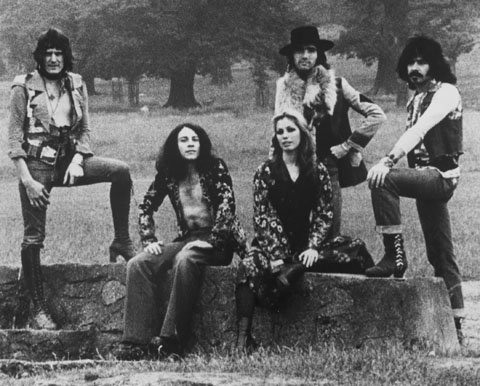Photo Courtesy of David Randall-Goddard
Carmen
Fandangos In Space
A few years back, Rolling Stone published its list of the Top 50 prog rock albums of all-time, spanning multiple regions, degrees of commerciality, and release dates.
This has become a crucial guidebook for me as I continue to navigate the prog waters — uncovering lost or forgotten gems in need some new polish.
While I feel the outlet’s list lacks some vital contributions (Nektar’s A Tab In The Ocean and 666 by Aphrodite’s Child included), there are several included that have found their way into my steady rotation. Arguably the most unique and fascinating of these is Number 46 — Fandangos In Space by Carmen.
From its exclamatory first lyric “AHORA!” (translation “NOW!”) to its intense musicality (replete with towering falsettos, thunderous handclaps, layered harmonies, and frequent allusions to Spain), this album — which turned 45 in 2018 — is simply in a world of its own, especially within the prog genre.
Ask group founder David Randall-Goddard (formerly David Clark Allen), and he’ll tell you that was his intention for not only the album but the quintet as well from the get-go.
“I fell in love with Genesis on hearing their first album and I already was a Led Zeppelin fanatic,” Randall-Goddard told me. “My concept from the start was to combine those musical directions and visual sense of theatricality with the rhythms of flamenco and the technical virtuosity of Yes.”
Flamenco is a defining element for Randall-Goddard and ultimately Carmen. Born to flamenco performers who learned the dance’s varied forms and techniques while living in France and Spain, he began his musical training as a Spanish classical and flamenco solo guitarist. Then the Beatles came along and changed the scope of his musical direction.
“Their music inspired me to beg my parents to buy me an electric guitar and tell my horrified father I was bored to death with classical [music] and wanted to write my own music and sing as well,” he said. “The self belief of youth carried me past the fact I had no formal training in writing songs. My mom, of course, completely backed my change of career direction.”

Originally calling themselves “Los Angeles,” Carmen — also consisting of vocalist Angela Allen, dancer/vocalist Roberto Amaral, bassist John Glascock, and drummer Paul Fenton — released Fandangos in Space three years after forming. This is a seminal album for several reasons, namely that it was produced by famed David Bowie producer Tony Visconti and garnered two crucial fans through Visconti’s involvement — T. Rex front-man Marc Bolan, and Bowie himself.
“Bowie and Bolan were our first believers. They helped us immensely, Bowie in particular,” Randall-Goddard told me. “He was a very gracious man. We were the beneficiaries of his friendship and help when we needed it most.”
The album bears another important component that works in its favor — vocal and instrumental cohesion — a byproduct of the group’s intense work ethic well before they entered a studio to record.
“We literally practiced six to eight hours a day — four hours daily as a band, two hours vocally for our harmonies. Roberto and Angela put in two hours a day on dancing and choreography. I spent another two hours on my guitar technique,” Randall-Goddard explained. “It would be impossible to find that sort of time on a daily basis now. It’s why we were what we were — utter dedication and belief.”
For Visconti, who would later add production heft to groups like Thin Lizzy, the challenge (and opportunity) became transferring the group’s one-of-a-kind sound and presentation to vinyl. And he pulled out all the stops on Fandangos, including having his wife at the time, British songbird Mary Hopkin, sing prominently on the album’s title track.
“He produced and created a recorded sound for us effortlessly,” Randall-Goddard said. “We never felt he was impinging on our artistic vision. He was the sixth member of Carmen.”
The album, of course, is aptly named. Merging traditional Spanish culture with the spacey Mellotron-driven sounds of the future, Carmen unleashes a gargantuan and grandiose effort, as emphasized by tracks like “Bulerias,” “Bullfight,” “Lonely House” and “Tales of Spain.” Live footage of the band (see below) paints them as musical gypsies with their high-energy performance exuding sheer bravura.
“My goal was to have technical chops from everyone in the band, a unique and stylish communal visual style, an original sound and musical approach, a mind-blowing stage presence and lush four-part harmonies inspired by the Everly Brothers, Hollies and the Byrds,” Randall-Goddard said.
Though the group would garner some exposure in the U.S. as an opening act for acts like Santana and Jethro Tull, their debut album was left to become an underground cult classic — ahead of its time in many ways, but inaccessible to the musical climates brewing at the time. The group would release only two more albums, before disbanding in 1975.
“We weren’t understood to begin with,” Randall-Goddard told me. “It took almost two years of touring as an opening act in the States to begin to create a buzz. That was after almost a year playing in England. It was our live stage show, more than our albums, that finally attracted attention and started the doors opening in the States and garnering us critical acclaim.”
He adds: “We truly felt isolated and overlooked most of the time — especially after we broke up. It was as if it never happened. Heartbreaking actually.”
But Randall-Goddard is quick to add that he still feels a thrill in knowing the critical powers that be consider Carmen’s debut worthy of inclusion in prog rock’s pantheon.
“We weren’t aware of our fans back in the day. There wasn’t the means to connect so immediately as now,” he said. “All of us left have been astonished, touched and surprised at the level of ‘love’ Carmen engendered in the fans it has.”
As for me, only one word comes to mind after listening to Fandangos In Space on repeat these past few months: “Ole!”

***
Share your feedback and suggestions for future columns with Ira at vinylconfessions84@gmail.com.




















